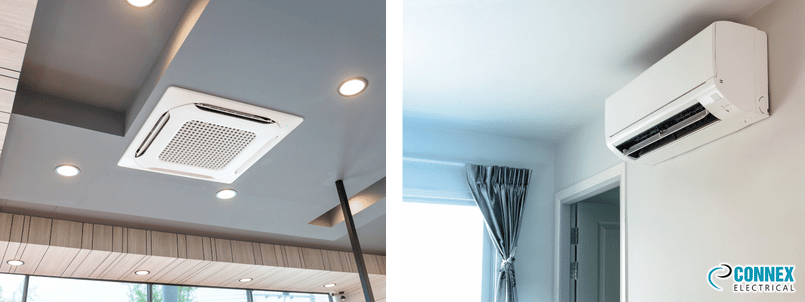Choosing the right air conditioning system is crucial for enhancing your home comfort while managing energy costs. In 2024, homeowners typically weigh between ducted air conditioning and split system air conditioners. Each type offers unique benefits, but understanding which is more cost-effective and suitable for your specific needs can be a challenge. This guide will help you make an informed decision by breaking down the costs, benefits, and ideal scenarios for both systems.
Understanding Ducted and Split System Air Conditioners
Ducted Air Conditioner and Split Air Conditioner are both types of air conditioning systems commonly used in residential and commercial settings. They differ in design, installation, and application. Here’s a breakdown of each:
Ducted Air Conditioner
A ducted air conditioner is a centralized system designed to cool an entire building or multiple rooms. It consists of one main unit, often located outside or in a mechanical room, and it distributes cool air through a network of ducts throughout the building.
- Centralized Cooling: One central unit cools multiple rooms or zones in a building. This makes it ideal for large houses, commercial spaces, or offices.
- Duct System: The cooled air is transported via ducts that are installed in the ceilings, walls, or floors. The air exits through vents or registers in each room.
- Discrete Design: The system is largely hidden from view, with only the vents being visible in the rooms. The central air conditioning unit itself is typically out of sight.
- Temperature Control: A single thermostat usually controls the temperature for the entire space. However, some advanced systems come with zoning technology that allows different rooms or areas to be cooled independently.
- Installation: Installation of a ducted system is complex and generally requires a major renovation or new construction, as it involves laying out ducts throughout the building.
Split Air Conditioner
A split air conditioner consists of two main units: an indoor unit (also known as the evaporator) and an outdoor unit (the condenser). These systems are designed for cooling individual rooms or smaller spaces.
- Two Main Components: The indoor unit is typically mounted on the wall inside the room, while the outdoor unit is placed outside the building.
- Cooling for One Room: Split air conditioners are generally designed to cool a single room, though multi-split systems can cool multiple rooms if required.
- Refrigerant Piping: The indoor and outdoor units are connected by refrigerant piping, which allows the system to exchange heat and cool the indoor air.
- Installation: Installing a split air conditioner is relatively simple compared to ducted systems. It does not require extensive ductwork, which makes it easier and more cost-effective to install, especially in existing buildings.
- Cost-Effective: Because of the simpler installation, split air conditioners are generally more affordable than ducted systems. They are perfect for smaller spaces or where you only need to cool one or two rooms.
Ducted vs. Split Air Conditioning: A Quick Comparison
| Feature | Ducted System | Split System |
|---|---|---|
| Installation Cost | Higher due to complexity | Lower, simpler setup |
| Equipment Cost | More expensive upfront | Affordable initial cost |
| Operating Cost | Efficient for large homes with zoning | May increase with multiple units |
| Maintenance | Requires professional servicing | Easier and cheaper to maintain |
| Best For | Whole-home cooling in large spaces | Single rooms or small homes |
Looking to cut down on energy use? Both systems can benefit from energy-saving strategies. Check out our 7 Smart Energy-Saving Tips for Brisbane Homes for practical advice.
Conclusion
Choosing between ducted and split air conditioning systems depends on multiple factors including your budget, home layout, and specific cooling needs.
Whether you decide on a ducted system or a split system, Connex Electrical offers professional installation and maintenance services to ensure your air conditioning investment is sound and efficient. For more guidance, explore related topics like Ceiling Fans vs. Air Conditioning: What’s Better? and 7 Key Factors When Buying a Ceiling Fan for Your Home to compare cooling alternatives.
Call us today to schedule a consultation or for more information about our services.

